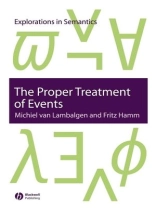The Proper Treatment of Events offers a novel approach to the semantics of tense and aspect motivated by cognitive considerations.
- offers a new theory of the semantics of tense aspect and nominalizations that combines formal semantics and cognitive approaches
- written accessibly for students and scholars in theoretical linguists, as well as in philosophy of language, logic, cognitive science, and computer science
- accompanied by a website at (http://staff.science.uva.nl/~michiell/) that provides slides for instructors and background material for students
Inhaltsverzeichnis
Figures.
Preface.
Par t I: Time, events and cognition.
Chapter 1: Time.
Psychology of time.
Why do we have the experience of time at all?.
Chapter 2: Events and time.
The analogy between events and objects.
The Russell-Kamp construction of time from events.
Walker’s construction.
Richer languages for events.
Some linguistic applications.
**Continuous time from events.
Conclusion.
Chapter 3: Language, time and planning.
Part II: The formal apparatus .
Chapter 4: Events formalized.
A calculus of events.
The axiom system EC.
Scenarios.
Minimal models.
Chapter 5: Computing with time and events.
Logic programming with constraints.
Minimal models revisited.
How to get to the other side of a street.
**When do causes take effect?.
Exercises for chapters 4 and 5.
Da capo, with feeling.
Chapter 6: Finishing touches.
Coding VPs as fluents and events.
Consistency, truth and partiality.
Part III: A marriage made in he aven – linguistics and robotics.
Chapter 7: Aktionsart.
Eventualities.
Formal definition of Aktionsarten.
Perfective and imperfective eventualities.
Chapter 8: Tense.
Reichenbach’s reference time R.
Event time and the sentence.
Present tense.
Past tense.
Future tense.
Exercises.
Chapter 9: Tense in French: Passé Simple and Imparfait.
Introduction.
Data.
Formalizing the Passé Simple and Imparfait.
Coda.
Exercises.
Chapter 10: Grammatical aspect.
The perfect.
The progressive.
**A computational proof.
Comments on the literature.
Exercises.
Chapter 11: Coercion.
Additive coercion.
Subtractive coercion.
Cross–coercion.
Temporal adverbials: ‘in’ and ‘for’.
Coercion and intensionality.
Exercises.
Chapter 12: Nominalization.
Two types of English Gerunds.
History of the English gerundive system.
Nominalizations formalized I: Denotation types.
Nominalizations formalized II: Lexical meaning.
Chapter 13: Appendix: the basics of logic programming.
Logic programming for propositional logic.
Logic programming for predicate logic.
References.
Index.
Über den Autor
Michiel van Lambalgen is Professor of Logic and Cognitive Science at the University of Amsterdam.
Fritz Hamm is Assistant Professor of General Linguistics at the University of Tübingen.












